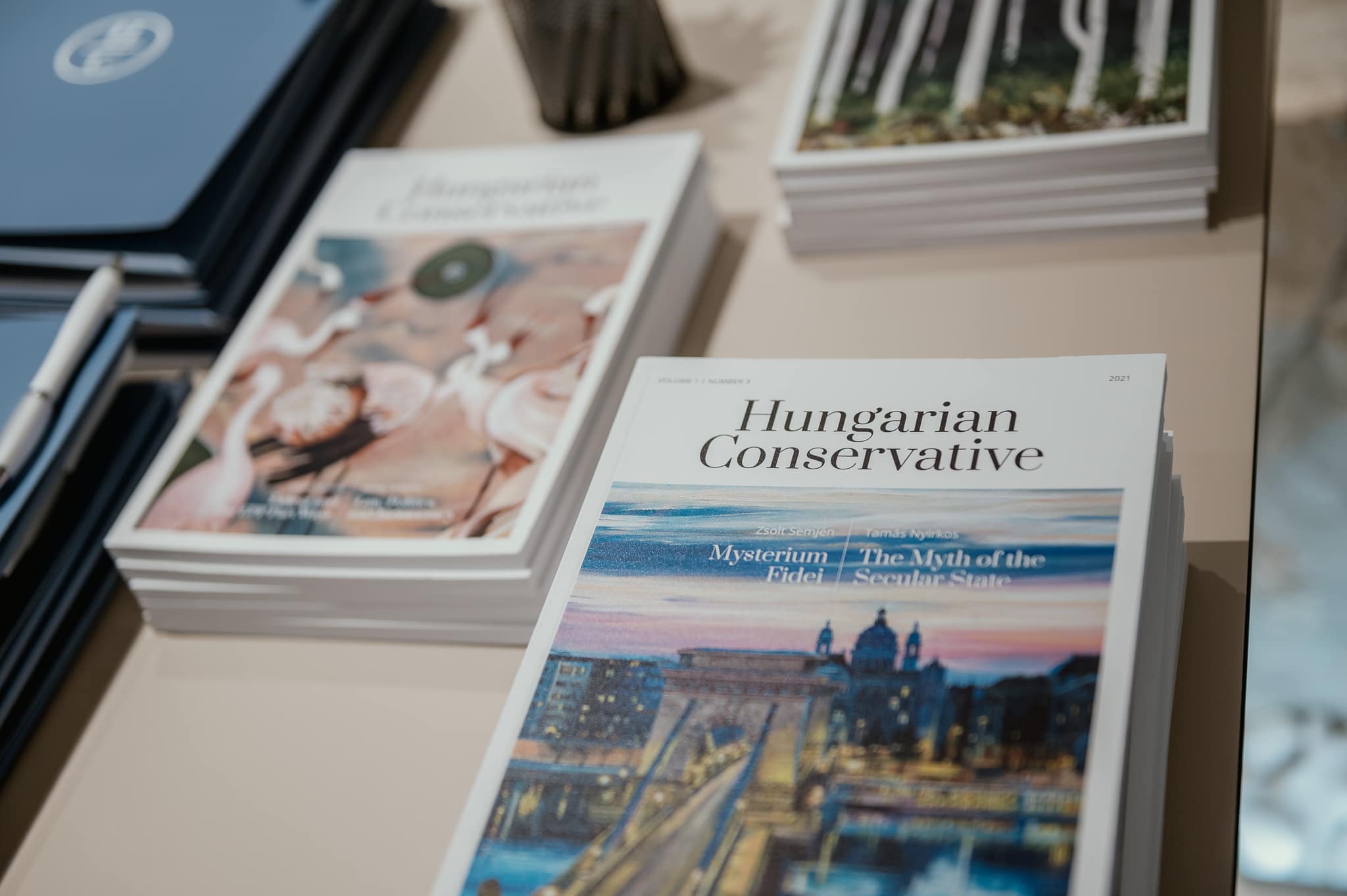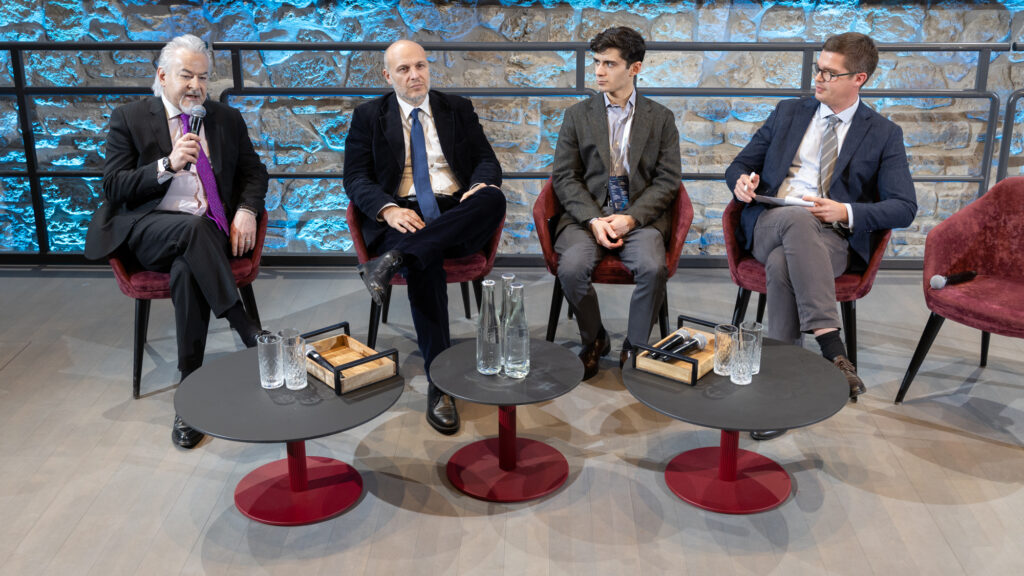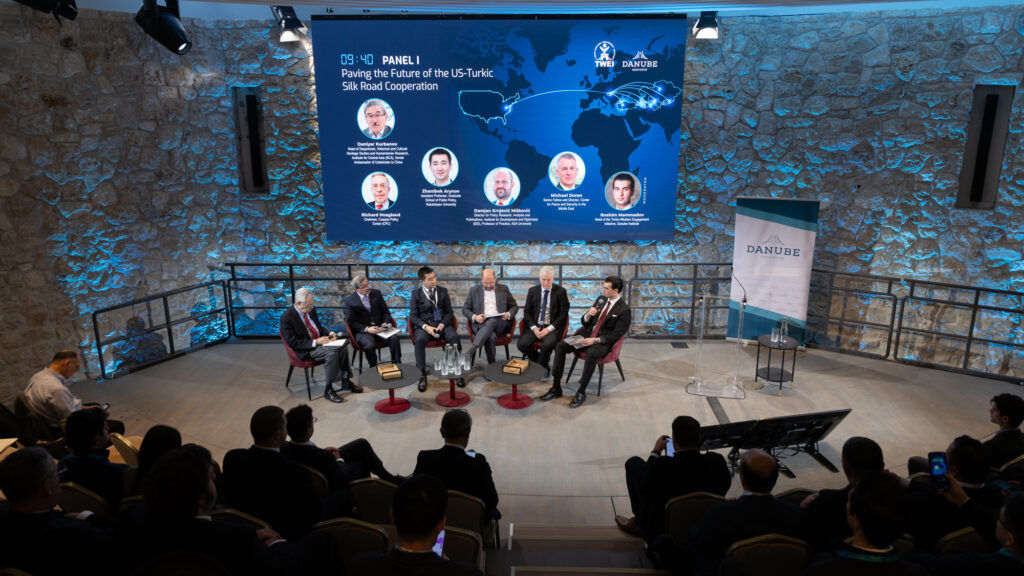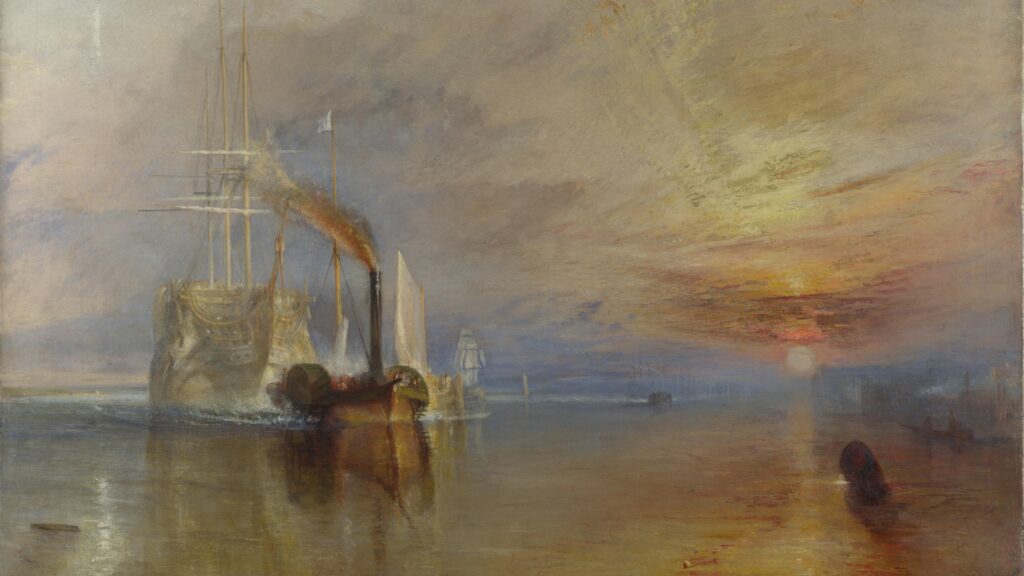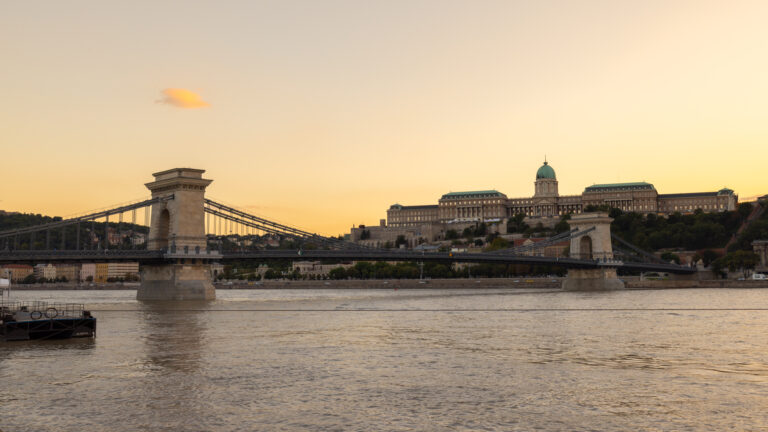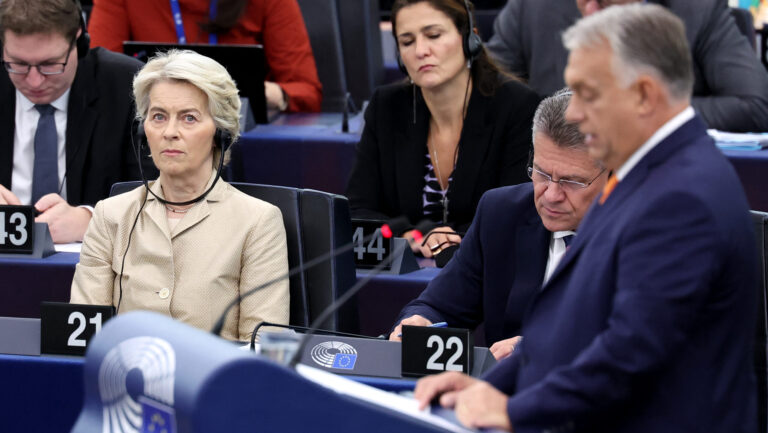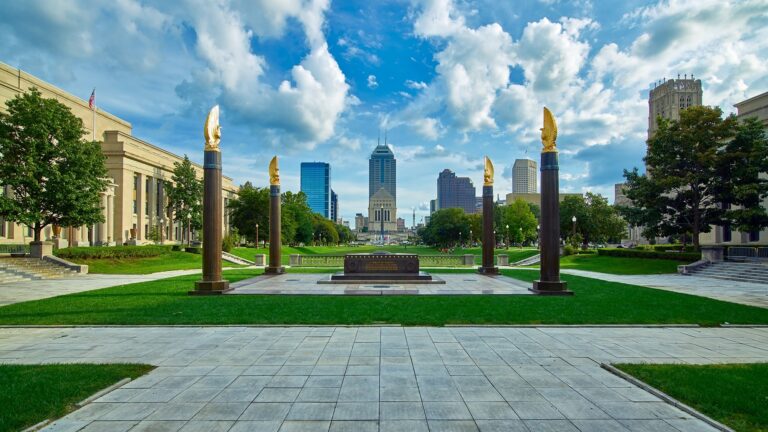Christianity around the world faces serious challenges in the twenty-first century from the emerging threat of new ideologies to persecution. The launching ceremony of the third issue of Hungarian Conservative offered a platform to panel discussions in this regard. What did Christianity give us? How can we define the Christian origins of our values and institutions? What are the challenges of post-Christian society? What is the future of Christian political activity? These were just some of the questions that the invited speakers sought to answer.
‘In the twenty-first century, conservativism, and thus Hungarian conservative politics and conservative thinkers face many new challenges. Therefore, a need appeared for a new journal which reacts much more directly and quickly to the challenges’ – opened Tamás Dezső the launching event of the third issue of the new periodical Hungarian Conservative, as president of the Batthyány Lajos Foundation. The historic building of Lónyay-Hatvany Villa where the event was held, received special attention. As the headquarter of the Batthyány Lajos Foundation, it aims to serve as a common room for conservative thinkers and is going to be the place where speech, faith, thought and writing is still free and is going to remain free.
The first panel, entitled ‘What did Christianity give us? The Christian Origins of Our Values and Institutions’ began with Tamás Nyirkos, associate professor at Pázmány Péter Catholic University, David Dusenbury Danube Institute visiting fellow, and Balázs Zoltán from Corvinus University. The discussion was moderated by John O’Sullivan, president of the Danube Institute.
The first panel’s topic was centred around the nature of the post-Christian society and the politics that was inevitably created by that
One of the biggest concerns regarding post-Christian societies is the congregation of different new faiths, new age faiths and the believers who tend to go from one faith to the next, like customers at a food court tasting dishes one after the other. But what happens if humanity ceases to believe in God, and in anything at all? As for the last century, Christianity flourished in atheistic societies and even though they were under considerable pressures to conform to official atheism, people still took the risk. What were their reasons for taking it and sacrificing their lives at times? Where they truly religious or were they also a manifestation of the human desire of self-assertion, rebellion and the need to say no? Another observation was that religious observance seems to be more threatened by the indifference of the liberal society than by oppression. The evidence for that is the experience of Europe since the Second World War and the experience of Central Europe since 1989. The final point of the panel was about the main characteristics of post-Christian society, also compared with post-Muslim society.
Regarding the questions raised, Tamás Nyirkos highlighted the complexity of understanding post-Christianity and secularization due to the very strange feature of secularization theories, which rarely follow the actual processes in the world. Balázs Zoltán pointed out the main values that Christianity as a civilizational force or as intellectual moral force has given us. These include the negative freedom to say no, the positive freedom to form human bonds, the reason to believe and moral self-knowledge. These four values together provide a solid foundation of our civilization. David Dusenbury argued with the idea of ‘conciencia’, which is one of the fundamental concepts of moral theology. As for Christian origins also several philosophical thinkers were mentioned, like Friedrich Nietzsche, St Augustine, Socrates and Plato.
Reflecting on current events – Michael Nazir Ali, one of the most distinguished Anglican bishops just being converted to Catholicism – the question emerged: what is the future of Christianity in the straightforward sense of church organisations? The disputants did not argue optimistically in the sense of the possibility of a grand scale religious revival in the West. What Christianity really faces today is not the secularization in the sense of a simple religious neutrality or ideological insanity in our society, but it is an environment which is frequently hostile. Perhaps the greatest hope for Christianity, certainly in Europe and the West lies in the adamant insistence on human dignity and humanity.
The panel continued with the questions of Christianity in politics. The radical human evil in the Second World War produced something of a religious revival and it certainly produced a revival of Christian political activities self-consciously with the birth of the Christian Democrats. We have just seen in the German elections that not only did Christian Democrats lost power but it would be fair to say that a lot of them feel that they have lost their purpose. So the question arises: what is the future of Christian political activity? The disputants argued more positively this time. Although the significance of Christian politics seems to diminish, parallel to that the political consciousness of their believers keeps on growing.
Nowadays, we can see that Christianity is challenged in its religious heartlands by the arrival of large numbers of other faiths which are, or which seem to possess the living fire of faith much more obviously. Consequently, the question is how Christians who have since become complacent forgetful will react to the arrival of large numbers of people who obviously vibrate with faith in society? Many theologians or political scientists of religion thought that, of course, it will help traditional Christian communities in the West to be more aware of their own heritage and their own values, however it did not happen to the extent that it was expected. So, in the West, the largest problems that Christian communities face are the new ideologies and new ideological movements arriving to their own countries and to a lesser extent, other faiths, for instance Islam.
The panel ended with the encouraging thought that we should not think that those Christians in the Middle Ages where so religious as we imagine today. It has never been a straight line, either up or down. That is one reason why we should not be very categorical when we say anything about the future, when we say anything about the decline of Christianity and its disappearance.
The second panel discussed the topic of ‘Christianity in the twenty-first century’ and was moderated by István Kiss, executive director of the Danube Institute and deputy editor-in-chief of Hungarian Conservative. The disputants included Rev. Mario Alexis Portella archdiocesan chancellor of Firenze, Juraj Šúst chairman of the Ladislav Hanus Community and Gergely Szilvay journalist at the weekly Hungarian conservative magazine Mandiner.
István Kiss introduced the discussion by outlining the two different perspectives on the current situation and the future possibilities of Christianity. The first approach takes a rather negative view as it emphasizes the slow death of Christianity since the French Revolution, while the second one is a bit more optimistic looking at Christianity as the continuation of the Christian faith.
Although statistical data shows that currently there are at least 2.5 billion Christians in the world, which still makes Christianity the biggest religion in the world
Rev. Mario Alexis Portella, as a Roman Catholic priest, highlighted some reasons why the situation within the Catholic Church is very disastrous, including the loss in the institution of the family and within our historical roots. In Gergely Szilvay’s approach, the problems of Christianity in the West originate from—besides the conflicts with the secular, post-modern, liberal world—its own laziness and excessive over-comfort. A religious awakening is really impossible on the long run without giving up this kind of comfort. Juraj Šúst distinguished Western and Central Europe from the aspect of Christianity. In his view, in Western Europe Christianity is present as a civilization, but the situation is different in countries like Poland, Slovakia, Croatia and surprisingly on political levels of Hungary. There is still a living Christian culture, even though not in the best condition, and this is the difference between Central Europe and the Western part of the world. It is no doubt, according to him, that Christianity should be in a public space influencing politics.
Regarding the future of Christianity, the disputers were sceptic. According to them, despite of the high percentage of baptized Christians in the West, it is much more a cultural act and not necessarily a religious one. The values which they agree (abortion, identity of women, meaning of marriage, divorce) are obviously against Christian values. However, on the other hand, an optimistic approach is possible because, at least, there is some sort of identification with the Christian faith.
Regarding the title of the panel, a very accurate question has arisen, namely whether Christianity can be replaced in Western Europe by the new ideologies of the twenty-first century, like climate-change or the Black Lives Matter movement. Also, freedom of religion can be in danger by some of the new-emerging political movements. As closing remarks of the panel, encouraging words were said that Christians should fight, should not give up or go away, but have to stand up and take on the religion, the values and talents deriving from Christianity.
The third and last panel, entitled ‘Prosecuted Christians in the twenty-first century’ was moderated by Alvino-Mario Fantini, editor-in-chief of the European Conservative. The participants of the discussion were State Secretary of the Aid of Prosecuted Christians and the Hungary Helps Program Tristan Azbej, Danube Institute visiting fellow Jeffrey Kaplan, and Mathias Corvinus Collegium’s visiting fellow Shea Bradley Garrison.
Alvino-Mario Fantini claimed that there is no question that Christianity around the world faces serious challenges in the twenty-first century. Regarding the panel’s title, he highlighted persecution and genocide faced by Christians. He also said that Hungary, with its cultural, intellectual and political leaders, is one of the few countries in the world today that dares to think in broad civilizational terms and recognizes the threat that certain groups, organizations and even some nation states pose to Christian faith. Tristan Azbej also referred to Christianity being attacked as from Western Africa through the Middle East to Central and East Asia, in the terms of human rights, this attack cause humanitarian crisis. In the West, on the other hand, the persecuted Christian values cause identity crisis for and within people.
However, there are places where churches are still being built, like in Hungary, where the government supported the construction of 120 churches in the last decade. That is the reason why when looking for a location to discuss issues connected to Christianity, Budapest is the right place since the city and the country thereby is trying to serve as a stronghold for Christian liberty. Jeffrey Kaplan categorized the emerging issues as historical ones, like religious competition and secularization, on the one hand, and violence on the other hand, which is emerging at different levels. Shea Bradley Garrison as a sociologist, highlighted the problem of individual Christians getting into direct conflicts with agendas backed by states. However, he was optimistic about the consequences, in the sense that Christians have to rearticulate their values because they are under attack and thus they can be strengthened. When discussing the insufficiency of international organizations which are officially aiming to help human rights and religious freedom, the personal experiences of the disputers added extra colour to the panel. Lastly, the experts shared their visions about the outlook of Christianity for the upcoming 5–10 years. Azbej Tristan pointed out that even though Christians are declining by numbers, but are strengthening by resilience. However, the need for a spiritual awakening cannot be denied. In the optimistic words of Shea Bradley Garrison, this is the most fantastic time to be a Christian because the opportunity is given to defend, to think about and to rediscover our faith.
The kind closing remarks were given by Tamás Magyarics, editor-in-chief of Hungarian Conservative. He made forward projections on carrying on this kind of exchange of minds and views in the future.

